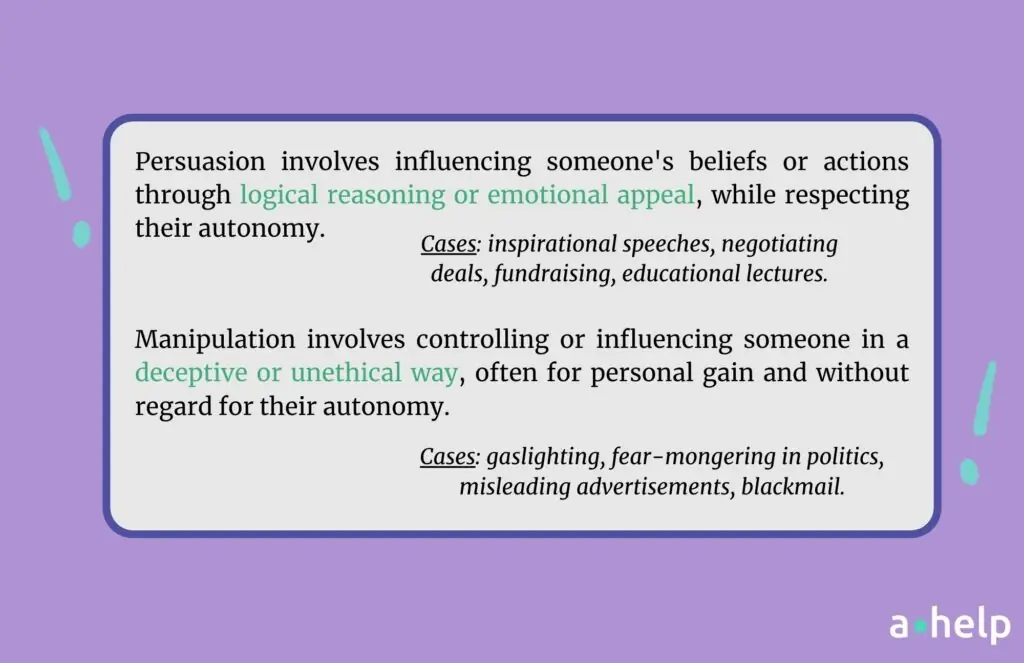The concepts of persuasion and manipulation are extremely important to understand in order to know the rules of social psychology. The difference between these two forms of influence is not just an academic exercise, but a practical necessity. In business, personal relationships, and politics, the ability to discern between persuasion and manipulation can significantly impact the outcomes of our interactions. Persuasion (when done ethically) can lead to positive change and mutual understanding, while manipulation can erode trust and breed resentment. Let’s dive in and once and for all make the destinctions between these two similar concepts.

✅ AI Essay Writer ✅ AI Detector ✅ Plagchecker ✅ Paraphraser
✅ Summarizer ✅ Citation Generator
To Persuade and to Manipulate – What’s the Difference?
| Persuasion is often seen as the art of positively influencing someone’s beliefs, attitudes, or behaviors. This can be achieved through logical reasoning, where one presents facts and arguments to convince others, or through emotional appeal, where one taps into the emotions of others to guide their decision-making. |
Examples of persuasive techniques include storytelling, where a narrative is used to convey a message; social proof, where the actions or beliefs of others are used as evidence to support a point; and appealing to emotions, where one evokes feelings such as happiness, fear, or sympathy to influence others.
| Manipulation is a more negative form of influence. It involves controlling or influencing someone in a deceptive or unethical way, often for personal gain. |
Examples of manipulation include gaslighting, where one makes someone doubt their own reality or perceptions; fear-mongering, where one uses fear to influence others’ behavior or beliefs; and exploiting vulnerabilities, where one takes advantage of someone’s weaknesses to manipulate them. Unlike persuasion, which is based on mutual respect and understanding, manipulation often involves trickery and deceit, leading to negative outcomes for the person being manipulated.

Key Aspects of the Two
The first critical difference between persuasion and manipulation is their intent. Persuasion operates on ethical grounds, aiming for outcomes that benefit all parties involved. It seeks to influence through logic and emotional appeal, respecting the other person’s ability to make decisions. In contrast, manipulation is driven by selfish motives, focusing solely on the manipulator’s gain, often at the expense of others.
Transparency is another distinguishing factor. Persuasion is characterized by open and honest communication, where all relevant information is shared to facilitate informed decision-making. Conversely, manipulation often involves deceit, where information is twisted or withheld to steer the individual toward a specific outcome.
Lastly, respect for autonomy sets persuasion apart from manipulation. Persuasion honors the individual’s right to make their own choices, even if they differ from the persuader’s wishes. Manipulation, however, seeks to control or restrict this freedom, employing tactics that undermine the person’s ability to choose independently.
Here’s the shorter version shown in a table for better understanding.
| Persuasion | Manipulation | |
|---|---|---|
| Intent | Ethical, aims for mutual benefit | Unethical, selfish motives |
| Transparency | Open and honest communication | Often involves deceit |
| Respect for Autonomy | Respects individual’s freedom | Undermines personal choice |
The Grey Area Between Persuasion and Manipulation
In conversations, it’s sometimes hard to see the line between persuasion and manipulation. For instance, a salesperson might focus on the positives of a product without mentioning the negatives, which can blur the line between the two. Or when a friend tries to convince you to do something, if they accept your decision, that’s persuasion. But if they make you feel guilty, it’s more like manipulation.
In these situations, it’s important to think about our goals. Are we aiming for a fair outcome, or just looking out for ourselves? Being honest about our intentions and the information we share helps keep things clear. Being aware of our actions is also crucial. We need to make sure we’re not pressuring others or ignoring their choices. By staying mindful of how we influence others, we can avoid manipulation and maintain respectful interactions.
Is Manipulation Always Bad?
Manipulation isn’t always a bad thing. Sometimes, it’s used in harmless ways, like when parents tell their kids that eating veggies will make them stronger. The aim here is good – they just want their kids to eat healthy. In jobs like advertising, a bit of manipulation is normal. Advertisers use catchy phrases and images to get our attention and make us want to buy things. It’s not necessarily harmful; it’s just how they do their job.
Even in relationships, small manipulations can happen without any bad intentions. For example, a partner might say they love a movie more than they actually do, just to make the other person happy. It’s not about tricking them; it’s more about sharing a nice moment together. So, while manipulation can be negative, especially when it’s used to deceive or control others, there are times when it’s just a normal part of life and not meant to hurt anyone.
So, to Answer the Main Question
Getting to know the concepts of persuasion and manipulation is vital, since human communication is basically one the most crucial parts of our lives. Recognizing the fine line that separates these two forms of influence is crucial if you want to protect yourself from such techniques. By exercising our critical thinking skills and creating a culture of transparent communication, we can improve the world. In doing so, we not only enrich our personal and professional lives but also contribute to a more respectful society.
FAQ
Follow us on Reddit for more insights and updates.





Comments (0)
Welcome to A*Help comments!
We’re all about debate and discussion at A*Help.
We value the diverse opinions of users, so you may find points of view that you don’t agree with. And that’s cool. However, there are certain things we’re not OK with: attempts to manipulate our data in any way, for example, or the posting of discriminative, offensive, hateful, or disparaging material.